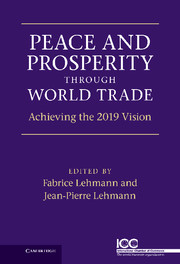Book contents
- Frontmatter
- Contents
- Notes on contributors
- Foreword
- Preface: the ICC vision
- Historical overview and dynamics
- Editorial note
- A Global systemic transformations
- B Governance of global trade
- C Poverty and global inequities
- Editorial introduction
- C1 Trade and poverty: an old debate rekindled
- C2 Trade policy as an instrument of social justice
- C3 Trade, employment and global responsibilities
- C4 Misconceptions about the WTO, trade, development and aid
- C5 Two hundred years after Jefferson
- C6 Trade, coercive forces and national governance
- C7 Gender equality in trade
- C8 Trading health for comfort
- C9 Unlocking entrepreneurial potential
- C10 Trade and security: a vital link to sustainable development in a troubled world
- D The long view on interlocking crises
- E Global business responsibilities
- Conclusion: the imperative of inclusive global growth
- Index
Editorial introduction
Published online by Cambridge University Press: 05 July 2011
- Frontmatter
- Contents
- Notes on contributors
- Foreword
- Preface: the ICC vision
- Historical overview and dynamics
- Editorial note
- A Global systemic transformations
- B Governance of global trade
- C Poverty and global inequities
- Editorial introduction
- C1 Trade and poverty: an old debate rekindled
- C2 Trade policy as an instrument of social justice
- C3 Trade, employment and global responsibilities
- C4 Misconceptions about the WTO, trade, development and aid
- C5 Two hundred years after Jefferson
- C6 Trade, coercive forces and national governance
- C7 Gender equality in trade
- C8 Trading health for comfort
- C9 Unlocking entrepreneurial potential
- C10 Trade and security: a vital link to sustainable development in a troubled world
- D The long view on interlocking crises
- E Global business responsibilities
- Conclusion: the imperative of inclusive global growth
- Index
Summary
Poverty and global inequities
Global poverty and the underpinnings of liberalization are tackled in this chapter. One of the questions of the early twenty-first century is whether lagging regions will follow the performances of the fast-growing, emerging economies. The immediacy of destitution implies that special attention must be paid to the weakest groups in society. Openness is generally considered to be a facilitating condition for income convergence on wealthier nations, but not a sufficient one. The strengthening of domestic institutional infrastructure, fairness in international rules and the extension of capabilities are all recognized as fundamental.
The first three authors introduce aspects of the trade–poverty nexus that remain controversial, highlight some of the issues to be addressed if trade policy is to be an effective instrument of social justice, and assess the globally observed increases in domestic income inequalities. The subsequent two articles offer contrasting perspectives on the rebalancing of trade rules, development potential in poor countries and the role of international aid.
We then turn our attention to three topics within a regional perspective: domestic institutional infrastructure in Africa, a focus on the Middle East and North Africa to provide a case study of the relationship between women and trade, and standards in the commerce of pharmaceuticals in vulnerable regions. This is followed by a commentary on the importance of entrepreneurship education. A challenge to the conventional view on the relationship between trade, development and security in the course of the past decades of reform closes the chapter.
- Type
- Chapter
- Information
- Peace and Prosperity through World TradeAchieving the 2019 Vision, pp. 125 - 126Publisher: Cambridge University PressPrint publication year: 2010

